

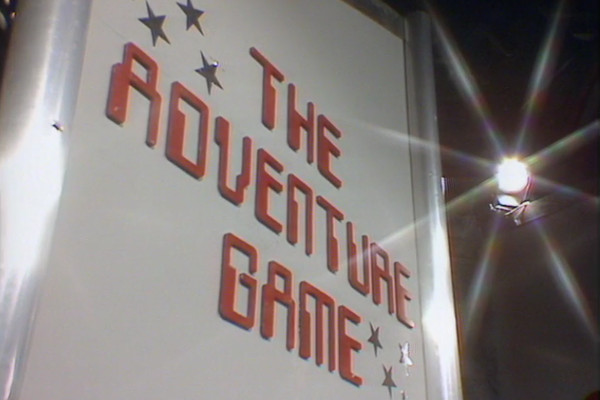
Revisiting the first series, it’s surprising how it developed as it went on; the most famous game, The Vortex, not being introduced until the second season, for example. The first season of The Adventure Game is currently available to buy from Amazon, please join me as I rank the episodes from worst to best...
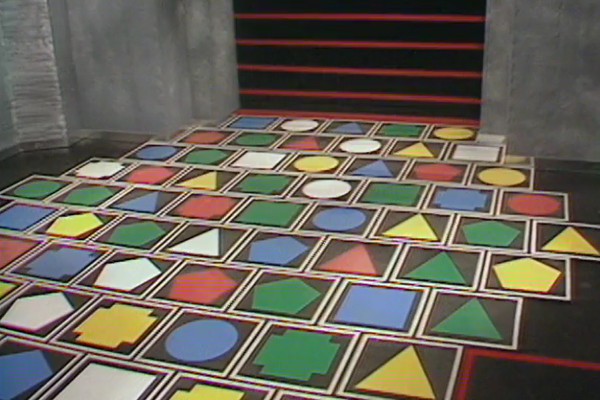
The BBC had a policy of wiping many of their programmes to save space, and four episodes of The Adventure Game from the first two seasons fell under this policy. While an off-air recording of this episode is believed to exist in the hands of collectors, it is not available as part of the BBC Store package.
Featured in this instalment were actress Liza Goddard, presenter Michael Rodd and, as always with the programme, the third contestant was a member of the public, in this case Stephen Cox. While there's every chance this was a classic instalment of the series, with all three being evaporated, its lack of accessibility means it has to go last in the ranking by default. Also missing from this ranking is the pilot episode, which was filmed before a studio audience, regarded by the makers as something of a failure, and never aired.
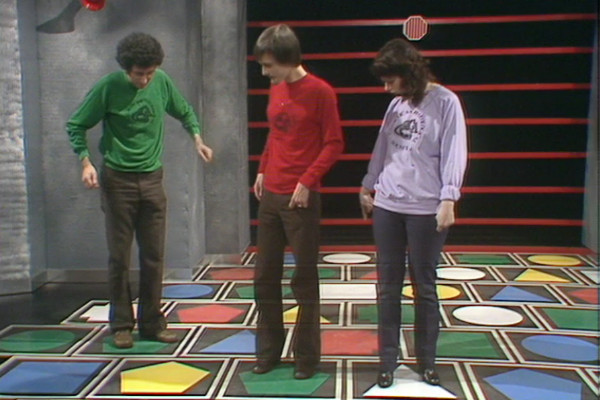
The first season of The Adventure Game does have a "prototype" feel at times, and, while the Uncle refuses to appear as a human in the final episode (the aliens are shapeshifters with a natural dragon-like appearance) he doesn't decide to become an aspidistra until season two. The backwards-talking Australian, who became a playground hit with his "Doogy Rev" didn't actually appear until season three, and here, a year before she became a newsreader, Moira Stewart makes a retrospectively surprising appearance as an alien. There's also Chris Leaver, who portrayed a grey-haired, ancient character, but who spends two episodes with his normal red hair and youthful look, the "ancient" appearance seeming to vary between a disguise and his "real" persona.
Making up the group is Charmian Gradwell as Gnoard (all the alien names are an anagram of dragon) and who is called by her real name at one stage in this episode, seemingly by accident. Contestants here are Elizabeth Estensen (then known for The Liver Birds, now more for Emmerdale), Play School presenter Fred Harris and the member of the public is Mark Dugdale. While the aliens get semi-scripted dialogue between them to explain the puzzles, there's no script between the contestants, meaning their non-committal discussions here can make the audience feel like a voyeur. It's a charmingly old-fashioned kind of television, the sort of thing that wouldn't be attempted today, at least in its current format. The Crystal Maze is often cited as being arguably inspired by the show, and with that 1990s Channel 4 series, Richard O'Brien was there to notably talk over any "dead air".
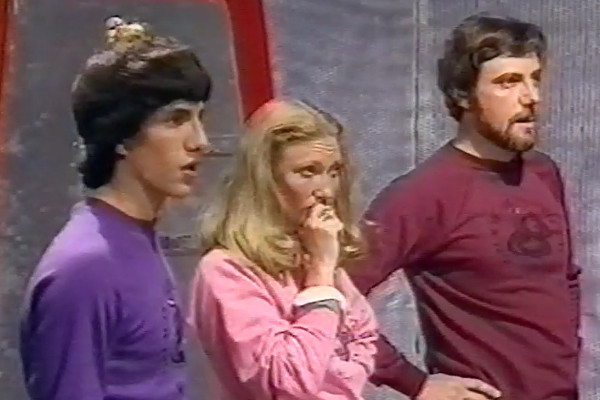
Another episode that was wiped, though is available on the DVD as an off-air recording, the quality inferior to the others but still very watchable. It's the most essential episode for this site's target audience, as Blake's 7 star Paul Darrow appears with Blue Peter presenter Lesley Judd and member of the public Robert Malos. Unfortunately Malos, undeniably a bright contestant, does tend to dominate proceedings in a way that no other season one public contestant did, meaning Darrow and Judd don't get much chance to shine. The three seem amiable enough, even if, during a weight-based game, you do want Paul to pre-empt his Avon character by a year and cry out "DAMN IT, WHAT WEIGHS 70 KILOS???"
One way in which the first season is clearly finding its feet is in the episode durations. Season two was generally 45 minutes in length; the final two seasons just under 40. This is the first episode to last 45 minutes, and also the earliest to be screened, broadcast at ten past nine in the morning. Such a wide variance sees the series trying to find its footing, and with the shorter episodes (episode one just 26 minutes) games often had to fade to edit points to fit all the events in. Lesley Judd would go on to have a much more prominent role in the programme's second season, where she featured each week as a fake contestant, "the Mole".
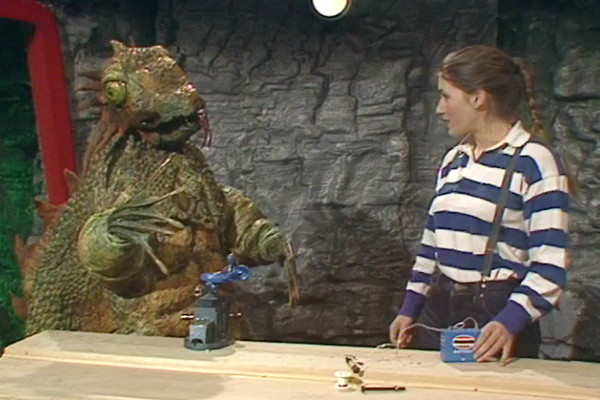
Dr. Garry Hunt (a regular on The Sky at Night) is joined here by Toby Freeman, a member of the public who went on to be a games consultant on the series after deviser Patrick Dowling emigrated to Australia and producer Ian Oliver was looking for ideas for the last two seasons. However, the real attraction here is eccentric actress Denise Coffey, who fully buys in to the situation, and screams in OTT terror when she's seen one of the aliens offscreen, much to the total bemusement of her fellow contestants.
Airing from May-June 1980, the first season of The Adventure Game was at the dawn of the home computer age in Britain, and so a BBC Micro game perplexes Coffey, who, reading in a text game that she has to find a fish on the floor, begins looking for said fish all over the studio. The incredibly complex games take so long for the contestants to figure out that the episode ends with them returned to their ship without having to pass back over the Gronda "tiles" game.
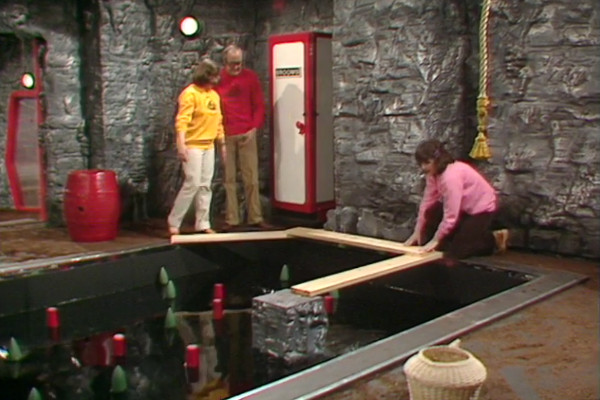
A 37 minute episode whereby presenter Maggie Philbin is joined by TV scientist James Burke, and member of the public Pat Cater. This episode places first thanks to Burke, who, while not exactly out-and-out grumpy, is the most terse of the season one contestants. Still produced very much in the age of patriarchy, Burke constantly tells 25-year-old Philbin that she's a "good girl", and gets impatient when puzzles aren't immediately solved. A special highlight occurs when a game involves walking across planks, which sees Burke kindly tell Cater on a number of occasions that Maggie Philbin is "the lightest".
This was an age where members of the public weren't a mainstay of television, where the station closed down after the quarter past midnight weatherman and didn't come back on until quarter past seven the next day for Open University. It was an age where "regular people" were generally there to watch television, not appear on it, unless as quiz show guests or in news reports. Consequently the interactions between the two celebrities and the "normal" contestants can be enlightening, as Burke tends to shut down and discourage Cater's verbal involvement. For the most charming episodes, then the first and last of the season have a pleasant camaraderie between the contestants. But as an episode where there's a slight parochial tension and a revealing insight into the way "celebrities" viewed the general public back then, this episode is key viewing.